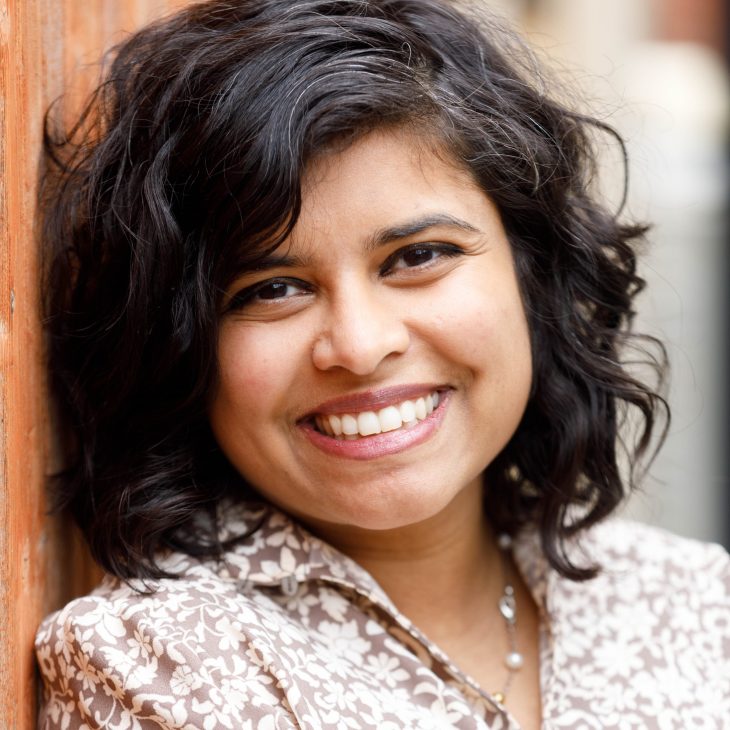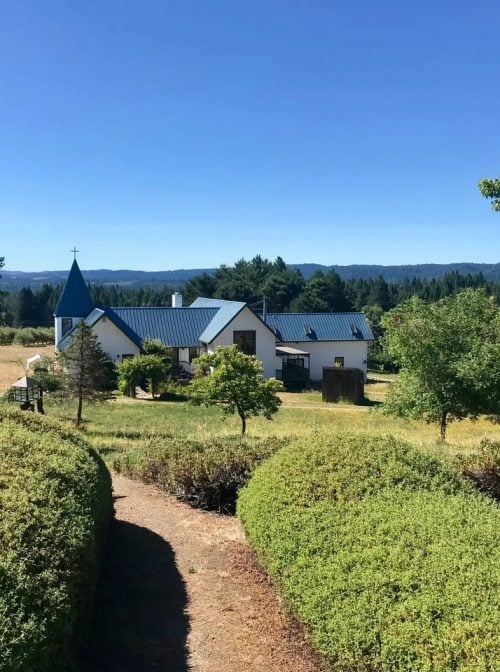It was pitch black when we arrived. After hours on windy country roads, surrounded by almost impenetrable darkness and forest, my friend and I pulled up before an old wrought-iron gate and searched in the darkness to open the clasp.
The gates swung open to reveal a large, quiet farmhouse with a creaky wooden front porch. The air was fresh and crisp, and it was totally silent. The sky was lit with stars – after all, we were tucked away in a tiny corner of Sonoma County in Northern California, far removed from civilization. I breathed a sigh of relief – this was my first visit to the Starcross Monastic Community, and I felt at peace in the solitude and nature. I was hooked.
Starcross Monastic is a contemplative nonprofit multifaith community tucked away in the coastal hills of Sonoma County. The land is lush with olive trees (where they grow and produce their own olive oil) and gorgeous redwood forests. The organization was founded by Toby McCarroll (Brother Toby), Julie DeRossi (Sister Julie), and Marti Aggeler (Sister Marti, who passed away in 2016) in the 1970s after the three of them took monastic vows. Starcross was their dream to create a community of intentional living – a “spiritual sanctuary for people and nature.”
The history of Starcross is long and inspirational – Brother Toby, who has authored 14 books on spirituality, Sister Julie, and Sister Marti live their faith through their acts of service – they fostered children locally and in Romania during the AIDS epidemic, they held interfaith spiritual services and started a food pantry to serve their local community. For years, they were a place of retreat and refuge for contemplative thinkers and activists such as Elizabeth Kubler Ross and Paul Monette. Nearly 50 years later, they continue to serve as a welcoming home for spiritual seekers, young and old, who are interested in a space to reflect and be in a relationship with nature.
Earlier this year, I had the opportunity to interview Brother Toby and Sister Julie and to learn more about what inspired them to start Starcross and what they hope for young people today.
Editor’s note: This interview has been edited for length and clarity.
Anu Gorukanti: What inspired you to take monastic vows?
Brother Toby: It was the mid-1960s, and people searched for ways to redo the world. During this time, humanistic psychology came up, as did the idea of the human potential movement. The humanistic psychology aspects soon morphed to include a bridge between psychology and spirituality and between Western and Eastern spirituality, now often referred to as Transpersonal Psychology.
As a teenager, I went to a monastic boarding school and had little experience with it. [When imagining Starcross], we wondered which organization we wanted to mirror. We had close friends in a Trappist monastery and the last remaining Shaker community. Shakers were essential to us because they were a multifaith, non-denominational group.
Sister Julie: I didn’t feel particularly called to take a monastic vow, but I wanted to be part of this community. We took traditional monastic vows initially, and I was okay with doing that. They’ve since become more open, like an affirmation or aspiration.
Anu: What faith tradition or spiritual views inspired your monastic vows?
Sister Julie: I had been raised Catholic and went to a Catholic University, but I really didn’t go along with the Catholic church on very much of anything. I was exploring all over the place, and that state of affairs continues – I’m still exploring.
Brother Toby: God, to me, has always been a term we use to explain a mystery we don’t know how to define. I so very much agree with Jewish faiths and others who never use the word G*d because it’s a mystery. We all have spiritual roots, which ought not to be thrown away. As Leonardo Boff says in “Cry of the Earth, Cry of the Poor” [Spirituality is] to hear these cries and to respond to them. I want to feel at home in something and feel like I belong.
Anu: How has your relationship to spirituality and faith inspired your work at Starcross?
Sister Julie: My faith is not a belief in doctrine or dogma. It’s a confidence in the interconnectedness and interdependence of everything. There’s trust in the essential goodness of people. People are doing the best they can, for the most part. It comes down to my desire to use any gifts or advantages to help lift less fortunate people.
Brother Toby: I agree with all of that. We must move away from “I meditate to feel good” to “I listened to the land for spiritual wisdom.” I was initially trained as a lawyer, so it was tricky to come to that conclusion, but my spirituality is trying to morph into the universe itself. One thing I really agree with Julie about is the need for compassion.
Anu: What advice do you have on relationships with people with very different beliefs?
Sister Julie: I’ve been avoiding giving my brilliant advice and wisdom to people, not asking for it right then. I listen with an open mind and heart.
Brother Toby: Someone once said that many things in spirituality are metaphors. And sometimes, it can be good to make a metaphor. [At Starcross], we have a bench outside the gate. It’s called a “chat bench,” where people who might not share each other’s views are invited to sit down at the bench and talk to each other human to human. Now, you know, only a few people are using the bench, but it symbolizes what we should be doing.
Anu: What is your hope for young people today after what you’ve witnessed over the last several decades?
Brother Toby: I have great hope for young people today. People in their twenties constantly surround me, telling me what I’m doing wrong on the computer. There is something there — they are searching. They are searching for a path. They don’t know, and I don’t know where they are going, but I feel they are moving in a better direction than I have seen in most of my life.

Anu Gorukanti
Anu Gorukanti, MD, is a public health practitioner and pediatric hospitalist. She is also the co-founder of Introspective Spaces, a social venture committed to building reflective space and community for women in healthcare. She was a member of the Sacred Journeys and Witness fellowships. She cares deeply about the well-being of her colleagues in healthcare and is passionate about healthcare reform to create equitable and compassionate care for patients and communities. In her free time, she loves to photograph landscapes, learn to dance, and spend time with her wonderful husband, friends, and family.




